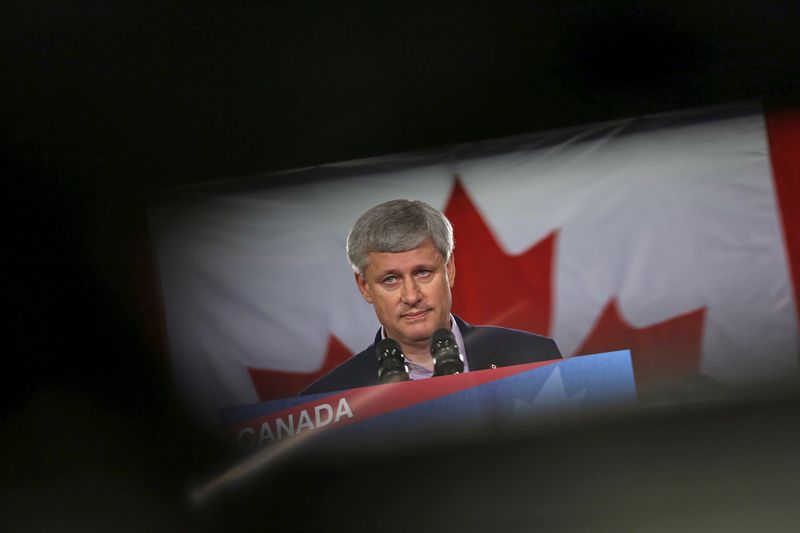(Repeating story first sent Thursday to additional subscribers)
By Julie Gordon
VANCOUVER, Sept 24 (Reuters) - Canada's Conservative Prime
Minister Stephen Harper is so out of favor with some voters that
they say they are prepared to back a political party they don't
usually support just to unseat him in the Oct. 19 general
election.
A number of groups have been formed to encourage Canadians
to vote strategically by taking a "Anyone But Conservative" or
"Anyone But Harper" stance.
That would mean backers of the two left-of-center parties,
the Liberals and the New Democratic Party, voting for whichever
of their candidates is the biggest challenger to the
Conservative rival in a particular seat. It can also mean
backers of smaller parties, such as the Greens, switching their
vote to a Liberal or NDP candidate.
The three main parties have been neck-and-neck in the polls
with about 30 percent support each. Even with Canada's
first-past-the-post system, no party looks set to win a majority
of seats. With a minority government likely, strategic voting
has the potential to change the outcome.
Strategic voting campaigns are not new in Canada, but this
time around the groups involved say they are better organized.
They include Leadnow, a non-profit group funded through
individual donations, which is doing polling in closely fought
districts, or swing seats. It has enlisted some 2,000 volunteers
to recruit voters who will back candidates with the best chance
of beating the Conservatives.
The group, which organizers stress is not affiliated with
the Liberals or NDP, said interest has been so strong it has
been able to nearly triple the focus of its 'Vote Together'
campaign to 31 ridings, as electoral districts are known in
Canada, up from 13 in August. It said 68,046 people so far have
pledged to vote strategically.
The group has not set a target but hopes to recruit as many
voters as possible, and noted more than 3,700 people have signed
up in the newly created riding of Vancouver Granville, where the
three-way race is tight.
While past strategic voting campaigns have been primarily
online-based, Leadnow is favoring old-fashioned outreach work
like phone calls and door knocking.
"It's the first time that anyone has done anything of this
scale, with this kind of (polling) information and with this
kind of volunteer capacity to get out the vote," said Amara
Possian, Leadnow's national campaign manager.
Another grassroots effort is strategicvoting.ca, a website
set up by Alberta-based information technology manager Hisham
Abdel-Rahman that identifies more than 100 districts where he
believes strategic voting could change the outcome.
He said he's had 12,000 unique visitors to the site in one
day and thinks that will increase as voting day approaches.
"In a lot of ridings, I think people think there is no way a
progressive candidate can win, so they don't vote," he said.
"But I'm hoping that if enough people go out, surprises can
happen."
Conservative Party spokesman Kory Teneycke downplayed the
potential impact of strategic voting, suggesting those behind
the campaigns were niche activists, unrepresentative of the
broader public.
"There are some people who will never vote for this
government and this party, and that's fine. This is a democracy,
people can make these choices," he said. "Do I think there is a
deep concern? No."
The strategic voting campaign is especially strong in the
last-to-the-polls western provinces, particularly British
Columbia, where for the first time results from populous Ontario
and Quebec will be broadcast before the local polls close. This
will allow late voters to see where the momentum is before
casting their ballots.
Harper, who is disliked by many left-leaning voters for his
tax-cutting, small-government agenda, as well as social policies
like tougher jail sentences, is seeking a rare fourth term.
Restaurant manager Saleem Carr said a desire to oust Harper
has turned him into a strategic voter. The 25-year-old plans to
vote for the NDP in Kamloops, British Columbia, a longtime
Conservative stronghold where the incumbent is now in a tight
race.
"My core values sit more with the Green Party, but they will
never get in government," said Carr, who recently stood outside
a Conservative campaign event holding a sign that read: 'Don't
be a Harpercrite! Vote A-B-C (Anyone but Conservative).'
British Columbia will have a greater influence in the coming
election after gaining six of 30 new districts in a national
redistribution that brought the number of House of Commons seats
to 338. Metro Vancouver, where results in many of its 23
districts are expected to be close, could end up being a
"kingmaker".
"British Columbians are probably going to be in a position
to decide the outcome of this election," Harper told reporters
at an event last month.
Strategic voting has had little effect in past elections,
partly because voters need consistent "signals" on who they
should back for it to work, experts say.
"In the past, when there hasn't been such signaling, people
have tended to follow the trends in national polls," said
Richard Johnston, a professor of political science at the
University of British Columbia.
On the ground in hotly contested ridings, some candidates
said they appreciated efforts to rally voters, but don't
necessarily expect their communities to think strategically at
the ballot box.
"My experience at the door is people don't seem to want to
be told how to vote," said Mira Oreck, an NDP candidate fighting
a tight race against Conservative rival Erinn Broshko and
Liberal Jody Wilson-Raybould in a Vancouver riding targeted by
Leadnow.
Others think it could have an influence.
"Strategic voting will play a little more (of a role) in
some of the ridings where the Conservatives may be in trouble,"
said Mario Canseco, a vice president with polling firm Insights
West.
(Editing by Jeffrey Hodgson and Martin Howell)
